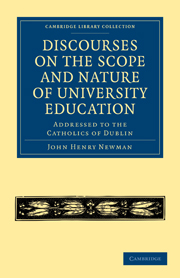Book contents
- Frontmatter
- PREFACE
- Contents
- CORRIGENDA
- Discourse I Introduction
- Discourse II Theology a Branch of Knowledge
- Discourse III Bearing of Theology on other Branches of Knowledge
- Discourse IV Bearing of other Branches of Knowledge on Theology
- Discourse V General Knowledge viewed as One Philosophy
- Discourse VI Philosophical Knowledge its own end
- Discourse VII Philosophical Knowledge viewed in relation to Mental Acquirements
- Discourse VIII Philosophical Knowledge viewed in relation to Professional
- Discourse IX Philosophical Knowledge viewed in relation to Religion
- Discourse X Duties of the Church towards Philosophy
- Appendix
Discourse VI - Philosophical Knowledge its own end
Published online by Cambridge University Press: 05 July 2011
- Frontmatter
- PREFACE
- Contents
- CORRIGENDA
- Discourse I Introduction
- Discourse II Theology a Branch of Knowledge
- Discourse III Bearing of Theology on other Branches of Knowledge
- Discourse IV Bearing of other Branches of Knowledge on Theology
- Discourse V General Knowledge viewed as One Philosophy
- Discourse VI Philosophical Knowledge its own end
- Discourse VII Philosophical Knowledge viewed in relation to Mental Acquirements
- Discourse VIII Philosophical Knowledge viewed in relation to Professional
- Discourse IX Philosophical Knowledge viewed in relation to Religion
- Discourse X Duties of the Church towards Philosophy
- Appendix
Summary
It must not be supposed, that, in the remarks I have made in my foregoing Discourse on the organic character (if I may use so strong a word in want of a better) of the various branches of Knowledge, viewed together, that I have been merely pointing out a peculiarity, which we may recognise or not at our pleasure; and that, on the ground, for instance, that a System of knowledge is more beautiful intellectually, or more serviceable in practice, true though this may be, than a confused litter of facts, or a heap of observations or rules. On the contrary, I assumed the fact of a System, and went on to point out some of the consequences which it involved. I assume, not only as incontrovertible, but as more or less confessed by all men, that the various sciences, which occupy the field of Knowledge, have, not mutual relations only, but run towards and into each other, and converge and approximate to a philosophical whole, whether we will or no:—so active is the sympathy which exists between them, so ready is the human mind to recognise, nay so impatient to anticipate, the Principle of System in all matters whatever, even at the risk of investing with laws and moulding into one, materials too scanty or too detached to sustain the process. Nor is it any unmixed compliment to the intellect thus to speak of its love of systematising; it is obliged to view its various creations all together from their very incompleteness separately.
- Type
- Chapter
- Information
- Discourses on the Scope and Nature of University EducationAddressed to the Catholics of Dublin, pp. 167 - 200Publisher: Cambridge University PressPrint publication year: 2010First published in: 1852



